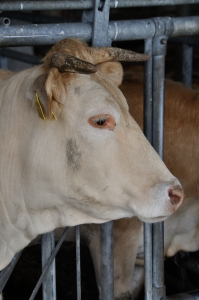It's estimated that as many as 91.5 per cent of Australian dairy and beef cattle herds, and just over half of all cattle, have been exposed to Bovine Pestivirus, more correctly called Bovine Viral Diarrhoea (BVD).
While most normally healthy cattle recover easily from the disease, up to 17 per cent of South Australian cattle herds are believed to contain at least one persistently infected 'carrier' animal.
Sasha Lanyon, PhD student, says many farmers are unaware that their herds are infected with BVD infection and that it is costing them money.
"BVD is a reproductive disease," Lanyon said.
"Cows can abort or have stillborn calves, or the calves can be infected with the disease while still in the womb. These calves become persistently infected 'carriers' which can never be cured and go on to infect others.
"The disease can also cause substantial losses through immune suppression leading to higher rates of other major cattle diseases such as mastitis."
Although there are reliable diagnostic tests available that can detect persistently infected animals, they can't identify cows that are carrying an infected foetus.
"These so-called 'Trojan cows' give birth to persistently infected calves which can cause serious loss to herds they are introduced to," Lanyon said.
"One South Australian herd lost nearly $150,000 in 2008 when a persistently infected bull carrying the virus was introduced to the herd, which had never been exposed to the disease before."
Lanyon, under the supervision of Professor of Veterinary Epidemiology Michael Reichel, is conducting a pilot trial in a small group of heifers carrying infected calves and, if successful, will continue with a full-scale trial next year. Preliminary results are promising.
"We're aiming to be able to detect low levels of virus in the cow during late gestation when the virus in the infected foetus crosses over the placenta," she said.
"The ability to identify cows with infected foetuses would minimise the threat of these 'Trojan cows' and be a very valuable tool in BVD control and eradication."
Lanyon has just presented her research at the World Association of Veterinary Laboratory Diagnosticians conference in Berlin, the premier conference in the field.

